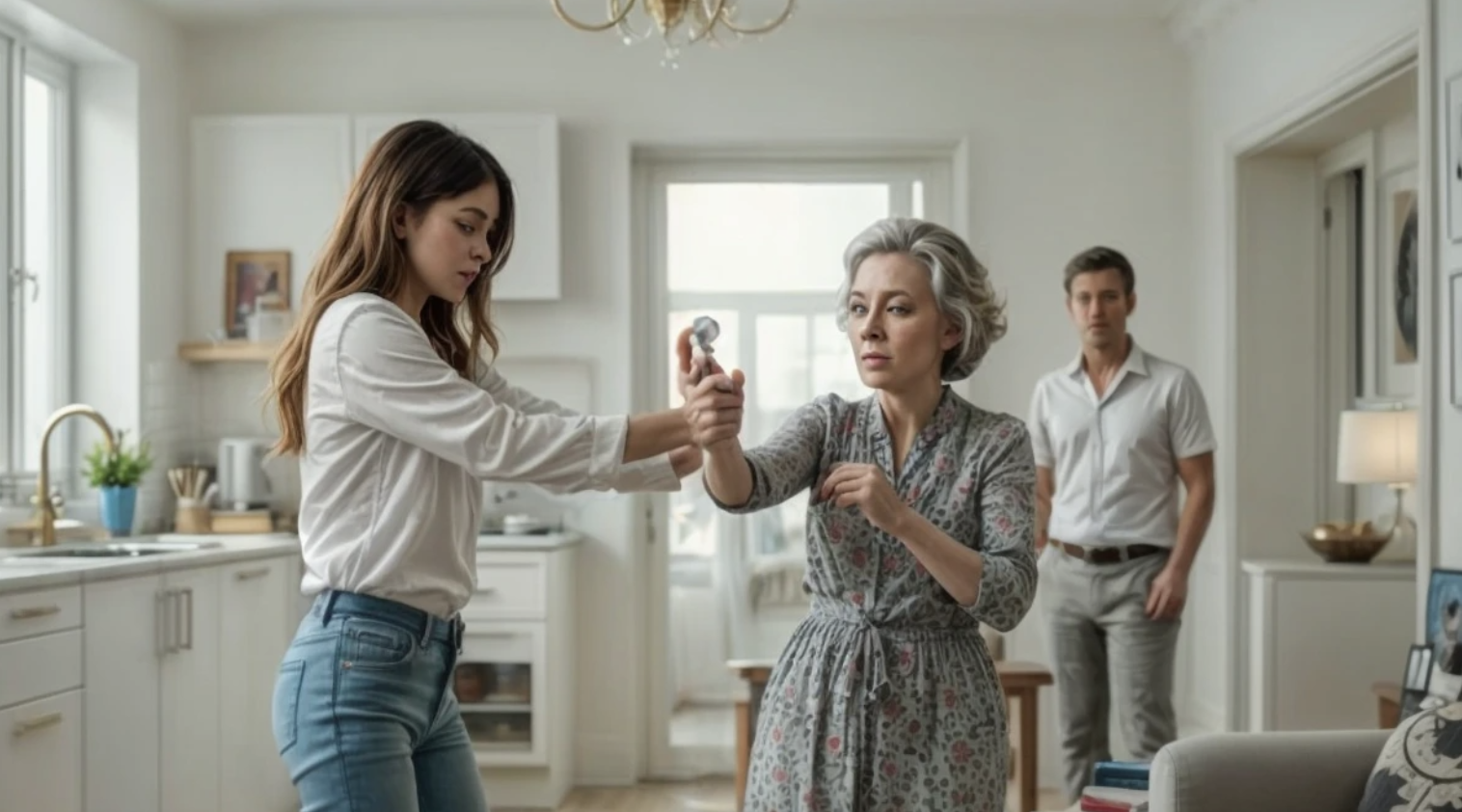— Did you put my things in the storage closet? — Olga’s voice rang out like a fork scraping an empty plate.
— Because they shouldn’t be lying around in the children’s room, — Irina replied calmly, but with a chill, drying her hands on a waffle towel.
— This isn’t a children’s room, it’s Dmitry’s room, he grew up in it!
— Twenty years ago. Since then he’s grown up, got married, and we live here now. Not you.
There was a pause. Thick and tense, like milk jelly in a Soviet cafeteria. Irina heard the kettle switch click. The water boiled. Literally and metaphorically.
— You know, I understand you don’t like me, — Olga sighed, walking into the kitchen and scanning every little thing — from the dried cabbage soup stain on the stove to Irina’s slippers crookedly placed by the door. — But that doesn’t mean you stop being my son’s wife.
— Thanks for the reminder. I thought I was just his gardener, — Irina snapped, pouring herself some tea.
She already felt a wave rising inside. The kind that makes you want to throw a cup, or scream, or just lie on the floor and cry, staring at the ceiling.
Olga, meanwhile, sat down. Straight. Like in a prosecutor’s meeting. She pursed her lips, straightened her back. Classic move: a sermon was coming.
— When I got married, Alexei’s mother lived in our apartment. Until she died. We respected her. Because we understood: she was part of the family.
— Did she make copies of your apartment keys without permission? — Irina turned sharply. Iron in her voice, hands trembling. — Did she come and rearrange your socks? Or move the flowers in the bedroom because “she liked it better that way”?
— Don’t exaggerate! — Olga raised her voice. — I’m a mother. I don’t need permission.
— That’s the whole problem, — Irina exhaled. — You decided that since you gave birth to Dima, everything that belongs to him automatically belongs to you. But the apartment is mine. I paid for it. I did the renovations. I put up the wallpaper. I washed these floors when I was dizzy with morning sickness.
— Oh, here we go! — Olga snorted. — Playing the pregnancy card. Want me to leave? Fine. I’ll leave. But don’t be surprised when your husband can’t stand it. Men don’t like their mothers being walked on. Especially by their wives.
— You know, — Irina slowly sat down opposite her, — men who can’t set priorities lose their families first. Then they start blaming everyone but themselves. I had a talk with Dima. He knows: it’s either you or us.
— You’re forcing him to choose?!
— No. You forced him. With your key. With your samovar. And that damned “I know everything, I understand better” attitude.
Olga was silent. But her gaze was heavy and focused. Like a warden catching a prisoner whispering. The silence lasted just long enough to become awkward. Then she stood, went around the table, poured herself some tea. All silently. Only a drop fell on the tablecloth — a tiny stain, like a mark: a war was fought here.
— I’m not your enemy, Irina, — she said softly. — I just don’t want my son to be under someone’s thumb.
— If being a wife means “under someone’s thumb,” then I’m scared to imagine what you were to Alexei.
Sarcasm snapped like glass. A crack appeared, but it didn’t break.
Irina stood up. Went to the bedroom. Closed the door slowly. Without a slam. Then just sat on the edge of the bed staring out the window. Outside, the trees were wet. Windy. Autumn. That gray, spiteful autumn when even the air smells hurtful.
How much longer? Why do I have to explain to a grown woman every day that I have boundaries? Why at thirty do I have to hide my underwear from my mother-in-law? Why does she even feel like the owner of my bedroom? Anger grew inside. Not quick like a flash, but thick and sticky like tar. Beneath it — exhaustion. Terrible exhaustion from fighting every day. For silence. For order. For the right to simply be.
Dmitry came home late. Tired. With eyes that begged not to start a fight.
— Hi, — he mumbled. — How was your day?
— Great. Your mother tried to repaint me again. This time — into a dull gray.
He scratched the back of his head. Sat down. Didn’t look into her eyes.
— Ir, maybe not now?..
— When, Dim? When she fires me from my home and puts me in the closet?
— She just… she doesn’t mean harm. She thinks she’s helping.
— By making copies of the keys?
He flinched. Apparently Olga hadn’t told him about that.
— What keys?..
— Dim. She comes when we’re not home. Checks the fridge. Washes the floor. Sometimes washes my clothes. And I don’t know if it’s care or a territorial takeover.
He was silent. Irina couldn’t stop.
— We’re having a baby. And I don’t want it raised in an atmosphere of “grandma knows best.” I don’t want her coming and telling me how to feed, how to treat, when to baptize, and which school to choose. I want her to live her life. In her apartment. With her own samovar.
— She might get offended…
— That’s not my problem, Dim. If a person gets offended because they’re not let into places they weren’t invited to — that’s not offense. That’s control.
Pause. Silence. Again. Their favorite pauses.
— So what do you want me to do? — he asked quietly.
— Give her back the keys. And tell her we’re a family. And she’s just a relative. Two different things.
Dmitry stood up. Slowly. Went to the nightstand. Took a key ring. Three keys. One with a pink rubber band. That very one.
He silently took it, walked to the door. Got dressed. Left.
Irina stayed. With the belly already slightly rounded under the T-shirt. With the kettle cooling on the stove. And that awful feeling when you’ve won but want to cry for some reason.
— You gave your mother high blood pressure. Was that your goal? — Dmitry’s voice was quiet but held something new. Tiredness. Anger. Or fear. Or all at once.
— I did?! — Irina stood sharply, making the coffee cup wobble and scrape the table. — Maybe you want me to send her an apology card for daring to have my own apartment?!
Dmitry didn’t answer. He stood in the hallway, seemingly unsure whether to come in. In his hands — an envelope. Old-fashioned, paper, with distinctly neat female handwriting.
Irina immediately understood: here it comes. The first “letter of happiness” from Olga. Now it would begin.
— She writes letters now? What? A curse? A death wish or just “daughter-in-law is the enemy of the people”?
He pressed his lips. Unfolded the corner of the envelope like a child told to read a bad grade.
— She asked me to pass this on. Said she didn’t want fights anymore but had to say something.
Irina crossed her arms. Sat back down. Stared. Come on, read it, dear. I’ve already heard “you’re destroying the family” in seven variations.
He read:
“Dear son,
I don’t know what I did wrong that your wife decided to exile me like a criminal. I who carried you under my heart, got up at night when you coughed, and ironed your school shirts.
Now I am extra.
I don’t blame her — maybe she’s a good woman. Just too young to understand that a mother is not a rival.
One day you’ll be a parent too, and you’ll understand how painful it is when you’re pushed out of your child’s life.
Don’t hold a grudge against her. But don’t forget who was always with you.
With love,
Mom.”
The silence was so thick you could hear the tap dripping in the bathroom. The curtain fluttering on the windowsill from the draft. The hurt scratching Irina’s heart.
— That’s manipulation, — she said without blinking.
— She just feels unnecessary.
— She makes herself unnecessary. Because she meddles where she’s not wanted. She has an apartment. A husband. Why doesn’t she live her own life? Why did she decide you’re her property and I’m just a temporary appendage to be returned?
Dmitry sat down. Weary. Shoulders slumped. Face looked like it aged overnight.
— I don’t know what to do.
— Think. Because I get letters too. From my intuition. It says: “Get out while you can.”
He looked at her as if seeing her for the first time. As if he didn’t know she could be so tough. But she didn’t want to be tough. She wanted to be soft. Wanted to be cozy. Wanted to cook borscht, not defend boundaries with a stool in her hands.
— Do you really think I’m caught between you two? That I have to choose?
— No. You already chose. You just haven’t realized it yet.
— And what did I choose?
— Comfort. Avoiding conflict. Sitting like Switzerland — neutral. Except, you know, Switzerland doesn’t have nuclear grandmas.
He gave a crooked smile. But there was no laughter. Irina stood, went to the sink, poured out the remaining coffee. At the bottom of the cup was coffee grounds, like a burned and forgotten heart.
— Today she came when we weren’t home. I saw my things in the closet — folded differently. The flowers in the living room moved. She came in. She still has a key.
— I took them…
— Apparently she has more keys than both of us combined. She didn’t leave. She just went around again.
Dmitry buried his face in his hands. Exhaled hollowly. She heard it — not a sigh but like a flare gun. He was starting to realize. Late, but better late than never.
— What do you want me to do, Ir? Tell me straight.
— Talk to her. Firmly. Like an adult. Not like a kid who wasn’t given a candy. Tell her you’re no longer under her control. That you have a family. And in it, you are a husband. Not a son at extended care.
Late at night he left. Said: to his parents. Said they need to put things straight. Without her.
And she stayed. With a small box in her hands into which she packed everything that reminded her of Olga’s “kind care” that day: cleaned spices where salt was poured into the cardamom jar; an orange rag she used to wipe “dust in the corners”; and a plush owl with “Family is everything” written on it, which unexpectedly appeared in the children’s room.
Family is everything. But not at any cost. Not at the cost of yourself. Not at the cost of fear in your own home. Not at the cost of apologizing for wanting to live your own life. Two days later came the second letter. Directly to Irina. No beating around the bush. The handwriting was the same. The message was different.
“You destroyed my family.
Now you’re probably happy.
But remember: a boomerang always comes back.
I won’t forget how you kicked out your husband’s mother.
I won’t forget how you stood between us.
May God forgive you.
I won’t. Olga.”
Irina stared at the paper. Didn’t tear it. Didn’t burn it. Just put it on the table and turned on the kettle.
— Boomerang, you say… — she whispered. — I wonder how it flies when you throw it at your own head.
Later that evening Dmitry came back. With eyes like he hadn’t spoken but fought to get out. He entered silently, undressed, put the keys on the nightstand. Wordlessly handed her one key. No rubber bands. No pink circles.
— I said it all. She… she’s not talking to me now.
Irina looked, then sighed.
— She is. Just now by letters.
He nodded. Didn’t argue. Just came over and hugged her. And she felt — he was growing. Right now. From a son into a man.
— She’s in intensive care. Blood pressure, heart… doctors say she might not make it through the night, — Alexei’s voice on the phone was just as quiet but had something icy today. — Dmitry… if you want to say goodbye — now’s the time.
Irina looked out the window. Clouds crawled across the sky as slowly and inevitably as this damn story — from “mom came for tea” to “mom is dying and now everything is on you, son.” She felt a heaviness rise in her. Not guilt — no. Someone else’s responsibility. Someone else’s burden. Someone else’s play that they were dragged into without asking.
She closed her laptop — it had been gathering dust for three days, like her articles. Everything pushed aside. Now it all came down to this: taking her husband to say goodbye to the mother who a month before accused her in a letter of destroying the family. With handwriting like on a tombstone plaque.
Dmitry was silent in the car. Hands gripping the wheel, but she was driving — she insisted. He was not in shape. He sat next to her like a child being taken to the dentist — afraid of the pain, but more afraid of being ashamed of tears.
— Do you know what to say? — she asked softly as they entered the hospital grounds.
— No. I don’t know how to talk to her. Especially now. Especially… after everything.
— Tell the truth. Not the one that’s convenient for her. But the one you carry with you every day. So if she doesn’t wake up… you know you said everything.
He nodded. And went.
She stayed in the car. Thirty minutes. Thirty-two. Then he returned. Sat down. Closed the door. Was silent. Then exhaled and said:
— She’s still trying to control me. Even lying under the IV.
— What did she say?
— That I’m cruel. That “this woman” destroyed me. That I was kind before. That she can’t leave until she knows I’m okay.
— And you?
— I said: I’m fine. Exactly because I chose not you, but family. My family. Wife. Child. I said I won’t pay for her pain with guilt. I’m not obliged to be her continuation.
— And?
— She turned away. Didn’t say more. Just said: “So you’re no longer my son.”
Silence. Only the car’s air conditioner clicked, switching to night mode. Irina covered his hand with hers.
— You didn’t stop being her son. You just became a man. And now you’re a father. Not a son running errands.
— She said she doesn’t want to see me or you if she comes out.
— Then she won’t come out.
They left.
A week passed under the burden of waiting. Every call was like a bullet: now they’ll say it’s over. Or the opposite. That she revived. And will start writing again.
Instead, on the fifth day, Alexei called.
— She left intensive care. Weak. But asked me to tell you that since “she doesn’t need such a son,” she doesn’t need care either. I’m leaving to the village to my sister. She’s alone. If you want — help. If not… well, that’s her choice.
He didn’t ask. Just informed. Like a judge tired of judging.
Dmitry looked at Irina. Then at their kitchen — sandwich crumbs, a frying pan with burnt eggs, an open jar of honey, the sound of the multicooker. Home. Their home. Without intrusions.
— I’m not going, — he said quietly. — I’m no longer in her trap. I’m here. With you. And with our son.
He said it for the first time like that. “Our.”
Irina was silent. Her chest clenched with a wave — not pain, not fear. Her own life. That was the price. And she paid it. But now she knew — it was worth it.
Two weeks later came the last letter. Handwriting shaky. Envelope crumpled.
“I’m no longer needed.
Everything I did was for you.
If you didn’t understand that, Dmitry, I regret giving birth to you.
If you chose the woman who took your mother away from you — don’t expect love from me.
I don’t know you anymore.
O.L.”
Irina stood by the window, the letter in her hand. On the windowsill — a pot with a ficus. Olga adored it but “if you don’t water it right — the leaves turn yellow.” Now the ficus was blooming. Leaves green like a life freshly washed clean.
She tore the letter. Slowly. Methodically. Each word — at will.
— That’s it. The end. You left our life. Voluntarily. Without trial. Without scandal. But loudly, as you liked.
When their son was born in March, they didn’t inform Olga. No calls. No photos. Alexei found out himself. Came, brought a tiny sweater knitted back when he still thought he’d be a grandfather “in a normal family.”
— She broke down. Left alone. But doesn’t regret it, — he said quietly. — Just got meaner. No matter how she tries — she hasn’t forgiven.
— But we did. And let go, — Irina said.
She closed the door. Next to her — Dmitry, holding their son. A son who still didn’t know anything about his grandmother. And maybe never will. Because boundaries are not hatred. They’re self-defense. Sometimes — with a gate. Sometimes — with a stun gun.
And this fence they built. Forever.



